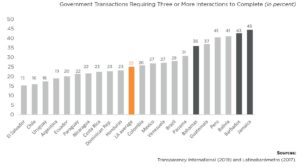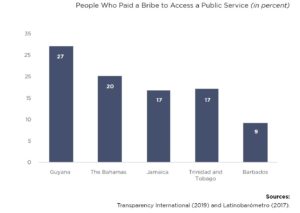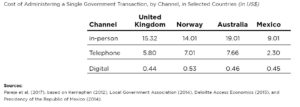It’s not unusual for Caribbean citizens or firms to expect that renewing a passport or registering a new vehicle will require them to spend a full day at a government office. That is, for those fortunate enough to complete their transactions in a single visit. On average, Caribbean citizens spent over 4 hours to complete their last government transaction. And this does not include the time waiting between multiple visits. Why are many government transactions in the region so complicated and time consuming and what can be done about it?
A recent study published by the Inter-American Bank (IDB): Wait No More: Citizen, Red Tape, and Digital Government: Caribbean Edition examines government transactions in the Caribbean and identifies 4 main problems. It also provides 5 recommendations to improve government service to citizens.
Problem 1- They Are Slow and Generate Transaction Costs for Both Citizens and Firms
Carrying out government transactions requires a lot of effort. Most transactions require many specific documents, long-lines, lots of questions and reading. Data from an IDB- Transparency International survey show that Caribbean people spent an average of 4.3 active hours completing their last government transaction. Compared to Latin American countries were citizens spent 5.8 hours on average, 4.3 hours may not seem that bad. However, very few transactions in the Caribbean can be carried out in just one visit. In Jamaica only 11% of transactions can be completed in 1 visit and 45% require 3 or more visits to complete. In Barbados only 23% of transactions can be completed in 1 visit and 43% require 3 or more office visits to complete. The report also discusses possible reasons for repeated visits including the existence of excessive requirements.

Problem 2- Government Transactions Are a Hotbed of Corruption
27% of people in Guyana reported having to pay a bribe to access a public service, 20% in The Bahamas and 17 % in Trinidad and Tobago and Jamaica. Manual government transactions, face-to-face interactions, and the lack of standardized processes means transactions are more vulnerable to corruption.

Problem 3- The Costs of Government Transactions Hit the Poor Harder
Government transactions affect the poor more. This segment of the population usually enjoys less flexibility at work, which makes it difficult to get time off to carry out government transactions. They also have fewer resources to cover the costs incurred in carrying out transactions. Complex forms that are hard to fill out, have a greater negative impact on people with lower educational attainment who lack the tools to navigate the system.
Problem 4- They are Expensive to Provide
In-person services are more expensive to provide due to personnel costs and other inputs such as office space and supplies. For example, in the United Kingdom a single in-person transaction costs the Government $15.32 USD, while the average online transaction costs $0.44 USD to administer. However, in the Caribbean, most Government transactions are not available online. Only 8% of citizens in the Caribbean report having carried out their last government transaction online.

The Bahamas, Barbados and Jamaica are currently implementing broad digital transformation programs to improve public services to boost the competitiveness of firms and to improve citizen experience. Also, the Government of Guyana has developed a broad program aimed at closing the digital divide by establishing ICT hubs that provide free access to the internet and equipment throughout the country.
Easy transactions are important for the competitiveness of firms. In terms of the ease of starting businesses in the Caribbean; Jamaica ranks in the top ten countries in the world. Since 2018 it has been possible to register a new company online. However, the other Caribbean countries are ranked much lower in this index even though their ‘Starting a business scores’ are much more positive.
What can governments do to improve the situation?
- Study the Citizen Experience with Government Transactions
Developing a clear understanding of the citizen experience is the first step to improving service.
- Eliminate as Many Government Transactions as Possible
The best government transaction is the one that does not have to be carried out. A single digital platform that stores and links citizen data reduces the number of transactions that would have to be carried out by individuals.
- Redesign Government Transactions with the Citizen Experience in Mind
Once the citizen experience has been understood, and unnecessary government transactions have been eliminated, the next step is to redesign all necessary transactions to make them as easy, intuitive and fast as possible.
- Facilitate Access to Digital Transactions
Once government transactions have been redesigned, the next step is to facilitate access through the digital channel. This relates to a complete framework for digital transactions including digital identity, digital signature, and electronic payments. It also involves expanding digital literacy programmes and guaranteeing that all online services work from any device.
- Invest in High-Quality Face-to-Face Government Transactions
90 % of all government transactions are still carried our in-person therefore it is vital to improve face to face service while progress is being made in digital development. This requires investing in and empowering staff who directly interact with members of the public and exploring the integration of services by providing many government services under one roof.
You can listen more podcasts from our Improving Lives in the Caribbean series here.


Leave a Reply